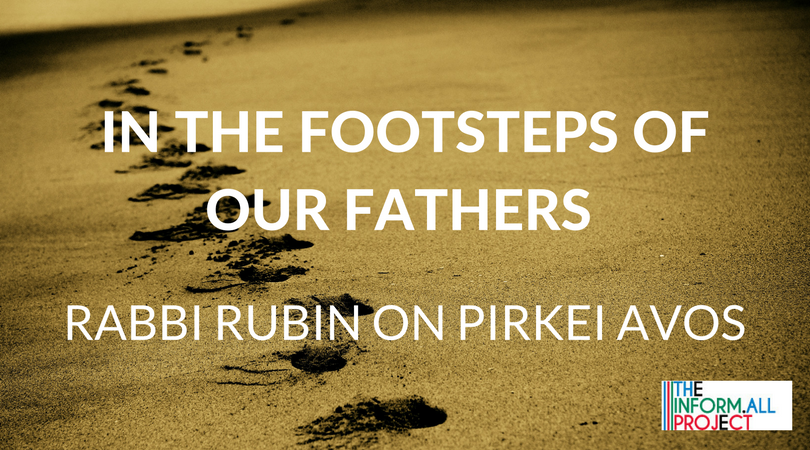Reward Points For Everyone | Avos 2:20 | Y. R. Rubin
IN THE FOOTSTEPS OF OUR FATHERS
Reward Points For Everyone
Avos Perek 2 Mishna 20
By Harav Y. Reuven Rubin Shlita
The concept of large chadorim is more or less a recent phenomenon. Back in the days in Europe people living in small villages would hire itinerant Melamdim to teach their children. In the time of the Chiddushei Harim of Ger ztz”l there lived a Yied who resided far from any large Jewish community and hired a Rebbe for his only son. The child was very sweet but was challenged educationally. No matter how hard the Rebbe tried, the youngster just couldn’t retain much of his learning in his head.
One fine day the baal habayis announced that he was going to the Rebbe of Ger with his son for a Shabbos and he would ask the Rebbe to test his son in learning. The poor teacher couldn’t catch his breath. What could he do? The Rebbe would test the child and the baal habayis would find out that he isn’t learning well and blame the teacher. For the next few days the desperate teacher tried to cram as much as he could into the boy’s head but to no avail. It was with a heavy and apprehensive heart that he saw them off on their trip to Ger.
On their return the father was so happy, gushing with pride. He described how he went into the holy Rebbe’s office with his boy and asked if the Rebbe would test the youngster. The Rebbe spoke with him for a few minutes and smiled to the father. The father asked how his son did and the Rebbe answered “Nisht Kusher”, which by Polisher Chassidim euphemistically means “quite good”!
The Melamed heard this and his head started spinning. He knew all too well that the child was no prodigy, and yet the Rebbe was so complimentary. The proud father thanked the Melamed profusely. He never believed that his son would do so well.
Some months later the Melamed himself went on a visit to Ger for Shabbos. When entering the Rebbe’s private room for a brocho, he couldn’t stop himself from asking how it was that the Rebbe indicated his positive impression of the boy’s learning when he, the teacher, knew all too well that the boy didn’t really learn his lessons. The Rebbe looked the teacher in the eye and explained, “The Torah has no limit, therefore there is no way in which one can measure against anyone else how much one learns. It’s not as if there is a line which one can strive for and everyone can be measured according to that level. Since this is the case, as soon as a child learns aleph beis, he is Nisht Kusher, he is on the path. Just as a more accomplished older Yied who finishes Shas, both are striving towards reaching higher. Therefore, I told the father Nisht Kusher, because the boy is on the road of learning and is doing his best…” Then the Rebbe said quietly, “Un mier kennen den?” which means, “and we do know”?
This was from the Chiddushei Harim, the greatest Gadol of Poland in his time, author of tens of seforim, who’s Torah illuminates the world till this very day: “and we do know?”
Certainly we all must strive to grow and learn ever more Torah, but this isn’t like a degree course which has a point system of pass or fail. Every Yied that starts learning and strives further is nisht kusher, worthy of compliments, given the dark world that surrounds us.
The Mishnah tells us:
Rabbi Tarfon says: The day is short, the task is abundant, the labourers are lazy, the reward is great and the Master of the house insistent.”
Learning Torah is a lifelong task. Everyone must participate, and everyone can grow. The Sfas Emes explains that the order of the various parts in this Mishnah is noteworthy. It is precisely because the day is so short, the task so immense and the labourers lazy, which refers to the human body’s natural tendency towards indolence, that the reward for leading a Torah life is so great.
We make a mistake when we try to measure one person’s level against another. We are all unique, with different capabilities and trials. The greatest error we can be guilty of is to exclude someone because he may not be at a level we have arbitrarily set. Does anyone know exactly what another human faces?
I often hear from Yidden about how they feel downtrodden because they never tasted what it is to be successful in their learning. They shy away from any shiurim, because from a young age they were made to feel incompetent. They tell me that learning’s not for them, and so life goes on and they feel a sense of emptiness.
We are living in the moments before the Moshiach, and our generation is facing trials heretofore unknown. Everyone needs to receive loving kiruv; we are all broken. We should make certain that every Yied has a place where his Torah learning can flourish. It is astounding that so many are willing to try. Nothing should stop us from respecting each other’s efforts. Let’s give chizuk and say Nisht Kusher Reb Yied, keep going. The day is short, the Moshiach is coming. May we soon bathe in his ultimate light of redemption together, with a bond of understanding and empathy.


